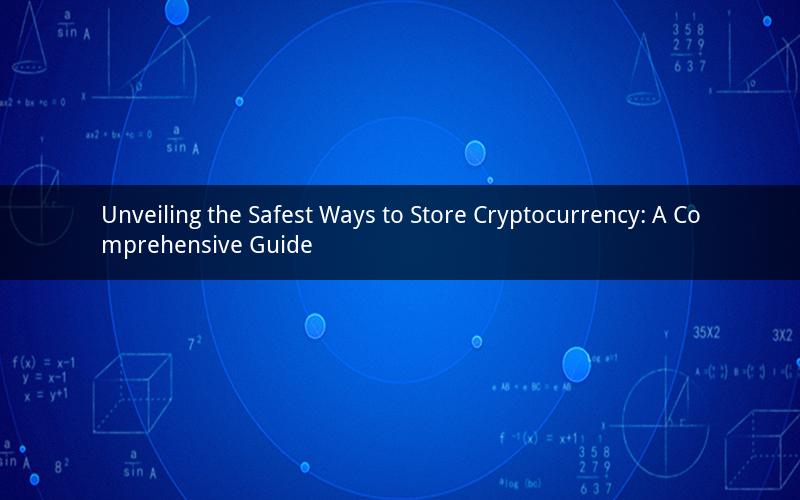
Introduction:
The world of cryptocurrency has grown exponentially in recent years, attracting millions of investors and enthusiasts. As the value of digital assets continues to soar, the need for secure storage solutions has become paramount. In this article, we will explore the safest ways to store cryptocurrency, ensuring the protection of your valuable digital assets.
1. Hardware Wallets: The Ultimate Security Measure
Hardware wallets are considered the safest way to store cryptocurrency. These devices store your private keys offline, making them immune to online threats such as hacking and phishing attacks. Here's how they work:
a. Hardware wallets generate and store private keys offline, ensuring they are not exposed to the internet.
b. They provide a secure interface for interacting with blockchain networks, reducing the risk of malware infections.
c. They offer advanced security features like multi-factor authentication and PIN codes.
2. Cold Storage: A Trustworthy Option
Cold storage refers to the practice of storing cryptocurrency offline. It involves using physical devices or paper wallets to keep your digital assets safe. Here are the different types of cold storage:
a. Paper wallets: These are essentially pieces of paper containing QR codes representing your private and public keys. They are easy to create and use, but can be easily damaged or lost.
b. External hard drives: Storing your cryptocurrency on an encrypted external hard drive provides an additional layer of security. However, physical damage or loss can lead to permanent loss of funds.
c. USB flash drives: Similar to external hard drives, USB flash drives can store your cryptocurrency offline. They are portable and convenient, but susceptible to physical damage or loss.
3. Mobile Wallets: A Balance Between Convenience and Security
Mobile wallets are digital applications that allow you to store, send, and receive cryptocurrency on your smartphone. While they offer convenience, it's important to choose a reputable mobile wallet with robust security features:
a. Look for wallets with strong encryption and secure key management.
b. Opt for wallets that support multi-factor authentication and biometric verification.
c. Avoid downloading wallets from untrusted sources or third-party app stores.
4. Web Wallets: The Risks and Benefits
Web wallets, also known as online wallets, are digital wallets hosted on a cloud server. While they offer convenience, they come with certain risks:
a. Web wallets are susceptible to hacking and phishing attacks, as they store your private keys online.
b. However, reputable web wallets implement strong security measures like two-factor authentication and cold storage options.
c. Always choose a reputable provider and ensure your web wallet is properly secured.
5. Multi-Sig Wallets: Enhanced Security with Multiple Keys
Multi-signature wallets require multiple private keys to authorize transactions. This adds an extra layer of security, as an attacker would need to compromise multiple keys to steal your cryptocurrency:
a. Multi-sig wallets are ideal for businesses or individuals who want to share control over their assets.
b. They can be set up using hardware wallets, software wallets, or a combination of both.
c. Always ensure that you have a backup of your private keys and that they are securely stored.
FAQs:
1. Q: Can I store my cryptocurrency on an exchange?
A: While exchanges offer convenience, they are not the safest option for storing large amounts of cryptocurrency. Exchanges are prime targets for hackers, and a single breach can result in significant losses.
2. Q: Are paper wallets safe?
A: Paper wallets can be safe if properly stored and protected from physical damage or loss. However, they can be easily compromised if someone gains access to your private key.
3. Q: Can I use a regular USB flash drive to store my cryptocurrency?
A: While a USB flash drive can be used to store cryptocurrency, it is not as secure as a dedicated hardware wallet. USB flash drives are susceptible to physical damage, loss, and malware infections.
4. Q: Are mobile wallets secure?
A: Mobile wallets can be secure if you choose a reputable provider and take appropriate security measures. Always ensure that your mobile wallet is updated to the latest version and that you use strong passwords or biometric verification.
5. Q: Should I use a single wallet for all my cryptocurrencies?
A: It's advisable to use separate wallets for different cryptocurrencies, as this can help you manage your assets more effectively and reduce the risk of losing them all in the event of a security breach.
Conclusion:
Storing cryptocurrency safely is crucial for protecting your valuable digital assets. By utilizing hardware wallets, cold storage methods, mobile wallets, web wallets, and multi-sig wallets, you can ensure the security of your cryptocurrency. Always prioritize security and choose reputable providers to safeguard your investments in the world of cryptocurrency.